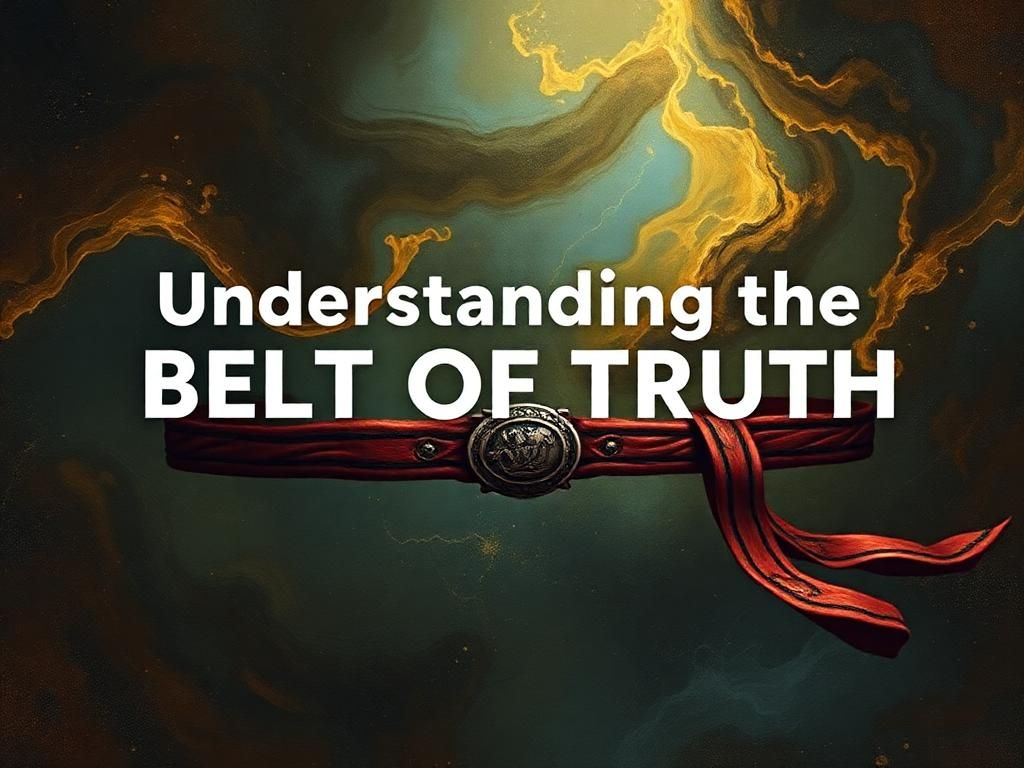The belt of truth meaning is a concept rooted in spiritual and practical realms, emphasizing the significance of truth in our lives. This principle is not only pivotal in religious contexts but also finds relevance in personal growth and societal interactions. This article will delve into the multifaceted meanings and applications of the belt of truth, offering insights for spiritual seekers, individuals striving for personal integrity, and community leaders looking to foster honesty.
Biblical Context
Origin in Scripture
The term belt of truth can be traced back to Ephesians 6:14, where the Apostle Paul describes the armor of God, urging believers to “stand firm then, with the belt of truth buckled around your waist.” The armor mentioned in this passage symbolizes spiritual protection and readiness against adversarial forces. Understanding the historical context of this passage is essential; it was written during a time of persecution for early Christians, emphasizing the need for inner strength and resilience through faith.
Symbolism in Christianity
In Christian teachings, truth represents a foundational pillar of faith. The belt, as a component of ancient armor, signifies support and stability. Just as a belt secures one’s clothing, truth secures a person’s moral and spiritual life. The belt of truth signifies a commitment to honesty and integrity, aligning one’s actions with inner beliefs.
Meaning and Interpretation
Theological Interpretation
The belt of truth meaning extends beyond mere honesty; it represents truth as a spiritual asset. In religious contexts, truth encompasses more than factual correctness; it is about aligning with divine principles and living authentically. The belt signifies that one’s faith should be anchored in truth, promoting a harmonious relationship with God and others.
Psychological and Personal Growth Perspective
On a personal level, truth serves as a foundation for integrity. Embracing the belt of truth can lead to enhanced mental health, as being truthful fosters self-acceptance and reduces anxiety. The metaphor of the belt of truth encourages individuals to cultivate self-awareness and authenticity, ultimately empowering them to navigate life’s challenges with resilience.
Practical Applications
Everyday Life
In daily interactions, the belt of truth becomes vital for developing meaningful relationships. Honest communication nurtures trust and understanding, whether fostering connections in friendships or forming strong bonds in family. In professional realms, truthfulness enhances teamwork and collaboration, driving success in organizational cultures. Prioritizing honesty in decision-making leads to more fulfilling and balanced lives.
Spiritual and Community Engagement

In spiritual practices, truth plays a pivotal role. Many faith traditions incorporate rituals that emphasize honesty and transparency. Encouraging openness within community groups strengthens bonds and fosters a supportive environment. As leaders demonstrate truthfulness, they inspire others to embrace integrity, creating a ripple effect in societal values.
Comparative Analysis
Belt of Truth Versus Other Armor Components
When examining the armor of God, the belt of truth operates in harmony with other components, such as the breastplate of righteousness. Truth acts as the foundation that supports virtues like faith and righteousness, creating a holistic approach to spiritual integrity. Each component of this armor symbolizes essential qualities that together prepare believers for spiritual warfare.
Belt of Truth in Different Cultures
Across various religions and philosophies, concepts of truth parallel the belt of truth meaning. From Buddhism’s emphasis on right speech to the philosophical inquiries of Ancient Greece, the pursuit of truth spans cultures and time periods. This cross-cultural perspective reveals the universality of truth as a value that transcends boundaries and enriches human experience.
Challenges and Misinterpretations
Common Misunderstandings
The application of the belt of truth can be fraught with misunderstandings. Notably, the distinction between truth and opinion often blurs, leading to conflicts in discourse. Furthermore, navigating personal truths versus absolute truths presents challenges in various contexts, including cross-cultural interactions. Acknowledging cultural relativism is crucial for a nuanced understanding of truth.
Overcoming Obstacles
To cultivate a culture of truthfulness, it is essential to adopt strategic approaches. Encouraging open dialogues and establishing norms that value transparency can help counteract dishonesty in society. Additionally, building resilience against deception requires both personal commitment and collective efforts within communities. Leaders can champion these principles by embodying authenticity and promoting integration of truth across all spheres.
Conclusion
The belt of truth meaning resonates across spiritual, psychological, and societal dimensions. Embracing truth equips individuals and communities to navigate the complexities of life with integrity and purpose. By fostering honesty and moral clarity, we can contribute to a world where truth is not only valued but also lived.
Additional Resources

Recommended Readings
– “The Truth About Truth” by David Icke explores the philosophical implications of truth in human consciousness.
– “Radical Honesty: How to Transform Your Life by Telling the Truth” by Brad Blanton emphasizes authenticity in personal relationships.
Related Topics
– The armor of God in Christian teachings can provide deeper insights into spiritual fortitude.
– Understanding truth and deception in psychological studies reveals fascinating perspectives on human behavior.
– Integrating integrity into leadership and governance fosters a more trustworthy society.
| Key Aspects | Details |
|---|---|
| Biblical Reference | Ephesians 6:14 |
| Primary Meaning | Spiritual integrity and honesty |
| Symbolic Role | Foundation for moral action and personal integrity |
| Comparative Dimensions | Universality in cultures and religions |
| Practical Application | Enhancing trust in relationships and communities |
| Challenges | Misunderstandings and cultural relativism |
| Strategies for Truthfulness | Open dialogue and cultural shifts |
Frequently Asked Questions
What is the belt of truth?
The belt of truth refers to the spiritual value of truth and integrity, often associated with biblical teachings, particularly in Ephesians 6.
How does the concept of the belt of truth apply in everyday life?
In everyday life, the belt of truth encourages honesty in personal relationships and integrity in professional settings.
What are some common misinterpretations of truth?
Common misunderstandings include conflating personal opinions with truth and navigating cultural relativism.
Why is truth important in spiritual practices?
Truth is essential in spiritual practices as it cultivates authenticity and fosters deeper connections with oneself and others.
How can I promote truthfulness in my community?
Promoting truthfulness in your community involves encouraging open discussions, leading by example, and establishing cultural norms that value transparency.
What psychological benefits does embracing truth offer?
Embracing truth can enhance personal integrity, reduce anxiety, and lead to greater self-acceptance.
Are there other cultures with similar concepts of truth?
Yes, many cultures emphasize truth as a core value, such as Buddhism’s right speech and various ethical teachings across different philosophies.
How does the belt of truth relate to other virtues?
The belt of truth complements other virtues like faith and righteousness, creating a comprehensive approach to moral integrity.
What steps can I take to foster honesty in leadership?
Fostering honesty in leadership includes embodying authenticity, encouraging transparent communication, and establishing ethical standards.
How can understanding the belt of truth benefit my personal growth?
Understanding the belt of truth can empower you to live authentically, improve relationships, and enhance your overall sense of well-being.
